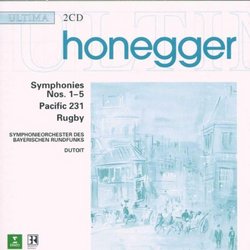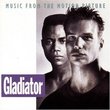| All Artists: Honegger, Dutoit, Bayerischen Rundfunks Title: Symphonies 1-5 / Pacific 231 / Rugby Members Wishing: 0 Total Copies: 0 Label: Elektra / Wea Release Date: 6/8/1999 Genre: Classical Styles: Forms & Genres, Theatrical, Incidental & Program Music, Historical Periods, Modern, 20th, & 21st Century, Symphonies Number of Discs: 2 SwapaCD Credits: 2 UPC: 639842134026 |
Search - Honegger, Dutoit, Bayerischen Rundfunks :: Symphonies 1-5 / Pacific 231 / Rugby
 | Honegger, Dutoit, Bayerischen Rundfunks Symphonies 1-5 / Pacific 231 / Rugby Genre: Classical
|
Larger Image |
CD DetailsSimilar CDs
|
CD ReviewsUnjustly forgotten music. N. Daniele Pietro | Milano, MI Italy | 12/14/2000 (5 out of 5 stars) "Here's one composer that has fallen into a relative obliivion. Among "Les Six" , a group of provocative young composers thriving in the ebullient Paris of the 1920's, Honegger (1892 -1955 ) was the one who achieved the widest fame and actually entered the international concert circuit. Among the others Milhaud also seemed to make the breakthrough, but his self-consciously "shocking" music soon outstayed its welcome while Durey, Tailleferre and Auric never produced anything substantial. Poulenc, instead, was regarded as a guilty pleasure, a charming but superficial composer whose allegedly shaky technique precluded him the big symphonic form. Big symphonic form that was exactly Honegger's forteè. After Honegger's death, though things began to change and now it's the once-ridiculed Poulenc that enjoys a far wider notoriety, thanks to the warmth of his music and its genuine intimate quality. Since the 70's (when Karajan's legendary account of the 2nd sym was recorded), Honegger's music slipped away from critical esteem, concert-halls and recording business. Suffice it to say that Dutoit's set is the only major digital cycle, and it was recorded in the mid 80's! Clearly, the post-war reaction again "conservative" music was a major reason for this but, also, I think Honegger's contradictions worked against him: he declared that he wanted to compose austere, highly serious music but, at the same time, he produced a huge number of works in almost any known form ( symphonies, oratorios, chamber music, movie scores) , with unavoidable unevenness of inspiration. At his best, though, Honegger is a highly rewarding composer. His music reflects a wide range of moods, being capable of lyricism and youthful exuberance, wild anger and desolation. Also, his evolution provides a rewarding variety of style, from the aggressive motorism of the 1920's to the austere Neo-Classicism of the later works. His orchestration is also very individual , featuring a peculiarly astringent, strongly contrasted sound, with original choices in instrumentation, like the frequent use of the saxophone. Luckily this set is not just an obligatory chioce but it's also highly recommendable. Not only is Dutoit at home with this repertoire, he also makes the Bavarians play this music as if it was their standard concert-fare. The peculiarly brilliant, silvery tone of this splendid ensemble sounds actually more attuned to the music than the sheen provided by the Berliners for Karajan, that sometimes buried in gloss the details (e.g. the trumpet in the 2nd, that can be heard here thanks to a better textural control and absolutely first-class recording). I'll try a brief description of the works. Sym 1: it's the less known, but it's one of my Honegger favorites. It's an eminently abstract work, whose orchestral virtuosity and exuberance sound very appropriate to Kussevitzky's Boston SO, for which it was composed. It also has a ravishing, intimate middle movement. Sym 2 and 3 are very much "war" symphonies, even if a way very different from, say, Shostakovich 7th. Rather than the struggle for the final victory, they express endless anguish and pain (1941's second), but also the rage for the loss of so many lives and the search for solace (1946's third). It's no concidence that these two feature some of Honegger's most angry, dissonant music. Sym 4 was composed for Paul Sacher's Basle orchestra (hence the subtitle) and it's indeed delighful, almost Haydnian in its luminous textures and smiling irony. With Sym 5 we return to severity and broad symphonic canvases. This one is also a splendid work, with a prevailing note of pessimism , both personal ( Honegger just had a stroke) and general ( he didn' like the direction music was taking, maybe he foresaw his own fate). The subtitle ( "of the three D's ") refers to the fact that the work's three movements end with that note. In my opinion it's the work that features more prominently a peculiarly Honeggerian "dark transparency" in the sound. (I know it sounds weird but I swear it makes sense once you hear the music! ) The first two Mouvements Symphoniques are Honegger's most famous works. Suffice it to say that neither the shatteringly inexorable progression of "Pacific 231" nor the endlessly seductive rondo-like gestures of "Rugby" deserve to be downgraded as "descriptive" music, as they often are. My quibbles: the ridicolously scanty notes provided and the fact that they could not include two essential pieces, the striking Mouvement Symphonique n.3 that Honegger composed for Furtwangler and the caressingly beautiful "Pastorale d'eté" To hear those as splendidly performed by this same team you should buy the other Honegger release in this series (Ultima 3984-24244-2). That also contains Le Roi David by Dutoit and several orchestral pieces conducted by Marius Constant. That's a less essential release, but those two pieces alone would be worthy the expense. I strongly recommend this one to everybody interested in 20th century music." Why is Honegger not more popular? John | Winnipeg, Manitoba, Canada | 03/21/2001 (4 out of 5 stars) "This is the only complete set of Honegger's symphonies. We are extremely lucky, then, that the performances on this album are so good. At the risk of repeating other reviewers I must say that I find it not only unjust, but inexplicable as to why Honneger is not more popular. His symphonies are varied, original and, with the possible exception of the fifth, of the utmost quality. From the youthful, often dissonant vigor of the first we move to tranquillity and absolute despair in the second, scored only for strings until the tension is relieved at the end by a solo trumpet. The third, like the second, was penned by an artist deeply affected by WWII. The fourth is a work of a completely different cut, with its delicate, almost chamber-like scoring and lighthearted material. The fifth is, in my opinion, his weakest, although it is by no means bad music. Rugby is a dynamic portrayal of movement in music, as is the overwhelming Pacific 231, a piece which paints a musical picture of a great steam locomotive. The sense of momentum Honegger creates in Pacific 231 amazes me every time I listen to it, if you close your eyes you can almost feel yourself hurtling across the countryside at hundreds of miles an hour. If you want a complete set of Honegger's symphonies this is the only option, and thankfully it's a very good one." The best complete set available Keith Peters | 08/30/2000 (5 out of 5 stars) "I bought these performances individually when they came out in the mid 1980s. They are probably the best played, most idiomatic performances of the Honegger symphonies conducted by the most noted conductor of French music today. Dutoit and the Bavarians bring out both the grit and the heartbreak in these deeply felt symphonies. If I have reservations about this compilation it is because they have eliminated some of the extra pieces that were in the original Erato releases, like the Pastorale and Mouvement Symphonique no. 3. However, with the major labels apparently scaling down their classical activity, I'm not going to quibble. You should probably get this one quickly before it goes out of print."
|

 Track Listings (9) - Disc #1
Track Listings (9) - Disc #1



